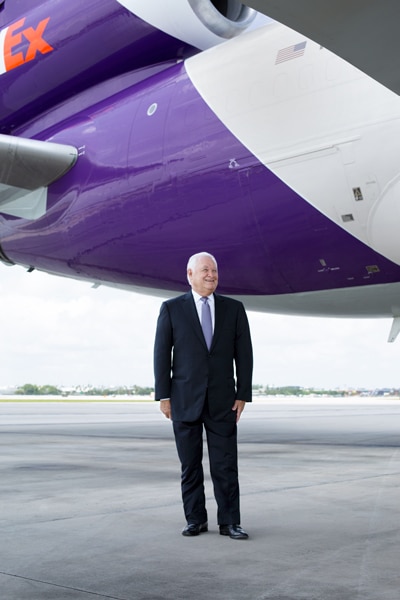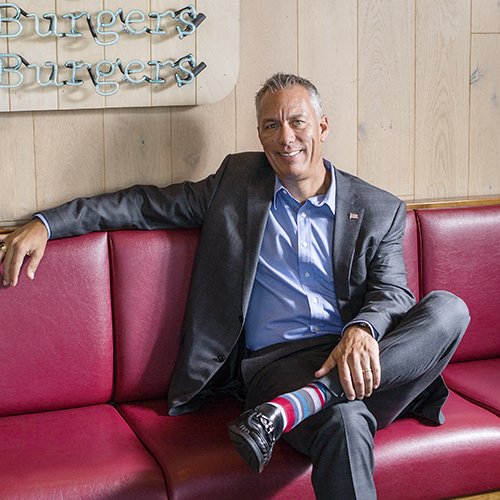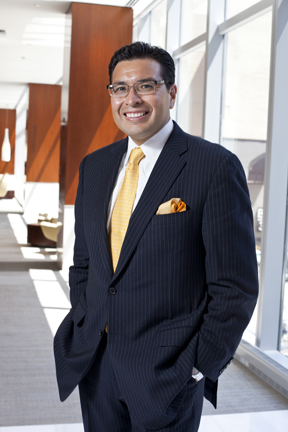|
Getting your Trinity Audio player ready...
|

In most of North America, the overnight delivery of packages, via FedEx Express, is assumed to be a convenience. But in the fifty-odd countries of Latin America and the Caribbean region, getting products to customers in one or two days is a huge, essential, and relatively new part of how small to medium-sized enterprises (SMEs) reach larger and distant markets.
It’s how those small businesses grow, and Juan N. Cento, president of FedEx Express Latin America, is the perfect person to explain how it all works. “We’re seeing a utilization revolution in Latin America,” he says. “SME companies can now compete around the world.”
The example he cites is a Colombian company that exports fresh flowers. The flower company’s aspiration was to be a global business, which is challenging given how fresh-cut flowers have a notoriously short shelf life. Cento’s team was able to show the company that it didn’t need its own shipping capability to reach distant customers. “Our experts looked at how to provide value to them in ways they didn’t know were possible,” he says. “We have refrigerated warehousing. It’s also how other perishables like seafood and medical supplies are shipped.” The company also employs SenseAware, proprietary tracking devices that monitor where packages are at and the temperature inside the shipment as needed.
Another company Cento points to is a manufacturer of hammocks in Yucatan, Mexico. The company didn’t know how to expand to Caribbean countries until FedEx showed it how to deal with import-export duties, taxes, documents, and payments. “Our platform helps them do this,” Cento says. “We minimize their costs and risks.”
It’s that kind of attention to customers and problem-solving that Cento enjoys most about his work. He proudly points out that the region has enjoyed robust economic growth; smart phones and investments in infrastructure have grown e-commerce and other types of business by 177 percent since 2014. FedEx Express can rightly claim a role in that growth, given the large footprint of the company.
Cento has been the Latin America and Caribbean (LAC) Division president of FedEx since 2000, but he has been with the company for more than thirty years. He began his career in transportation and logistics in 1984 with Flying Tigers, a delivery company that successfully connected Mexico, the Caribbean countries, and Brazil. Flying Tigers was purchased by FedEx in 1989. Today the entire LAC division under Cento employs twenty-six thousand people.
“That’s twenty-six thousand families that call FedEx home,” he says. Cento credits his team—direct reports as well as everyone working for the company—for being innovative and flexible. “They know how to take the business forward,” he says.
Each of those characteristics is critical to the business. The dynamics in many Latin American and Caribbean countries distinguish it from other regions. Political volatility plays a role in the regional economy and in how business is conducted. “As a global company, we constantly see challenging situations and other adverse conditions,” Cento says. “TPP and NAFTA could change next week.” He is not exaggerating when he says this.
Cento says he and his team closely monitor political and regulatory issues out of necessity in all of the countries of the region, with an eye on how the political landscape affects customers. In his more than thirty years with the company, that has included multiple scenarios that involve cross-border trade and a range of issues, from protecting customers’ intellectual property to the customs-clearing processes. Cento, however, suggests that with every challenge comes a few opportunities as well.
To address security concerns, for example, the company has programs that protect the packages being shipped as well as the company’s delivery personnel. “The company has always been focused on safety,” Cento says. “We have global training programs in vehicle inspections and driver wellness; we sometimes handle hazardous materials. FedEx believes in having quality tools for everything.
In addition to training, the company and Cento place a priority on hiring for the long term because the company and the markets it serves are both exceptionally dynamic. The FedEx of twenty years ago isn’t the company it is today, given the digital information revolution, and what happens by the year 2038 will be quite different as well.
“We have to have people with the skills to take us forward,” explains Cento, who himself has always appreciated the way in which FedEx helped forge a stronger future for Latin America. Cento believes that thinking ahead about the dynamics of technology and business has had a lot to do with getting him to where he is today, and he is looking to the next generation of leadership to embody those skills as well.
“There’s a lot of talent already in our twenty-six thousand employees,” he says. “But they have to be willing to always acquire new skills, be able to manage new dynamics, and learn how to use new tools as they become available.” If an employee or new hire has the audacity to say they want Cento’s job one day, he says he loves that. “But just having the qualifications for today isn’t good enough,” he says. “You have to focus on the future.”
That future might be fueled by the significant growth in countries such as Brazil, Mexico, Costa Rica, etc. But the principles Cento learned from his father and FedEx founder Fred Smith transcend technologies and economies. “It’s not about short-term gains,” he says. “You need to be who you are; you have to believe in what you’re doing.”

